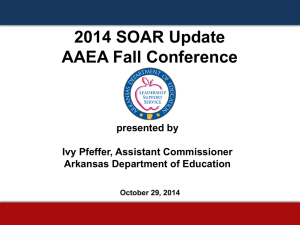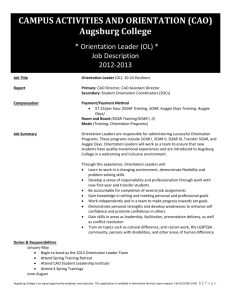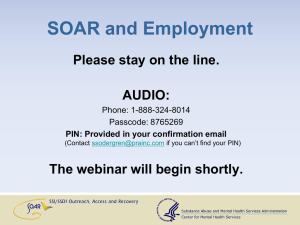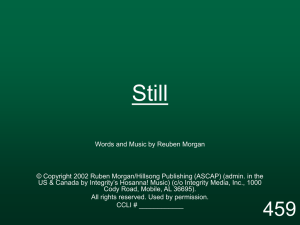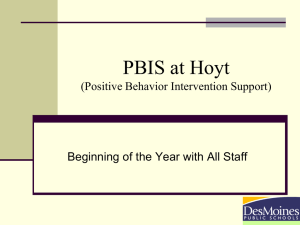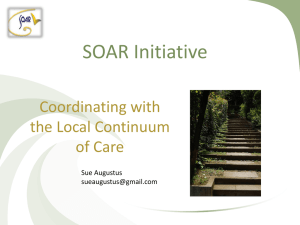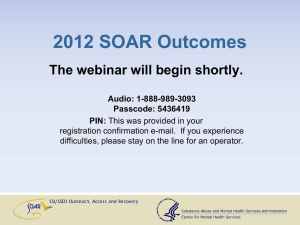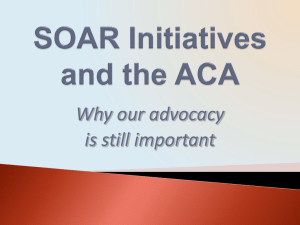PowerPoint Slides - SOAR Works!
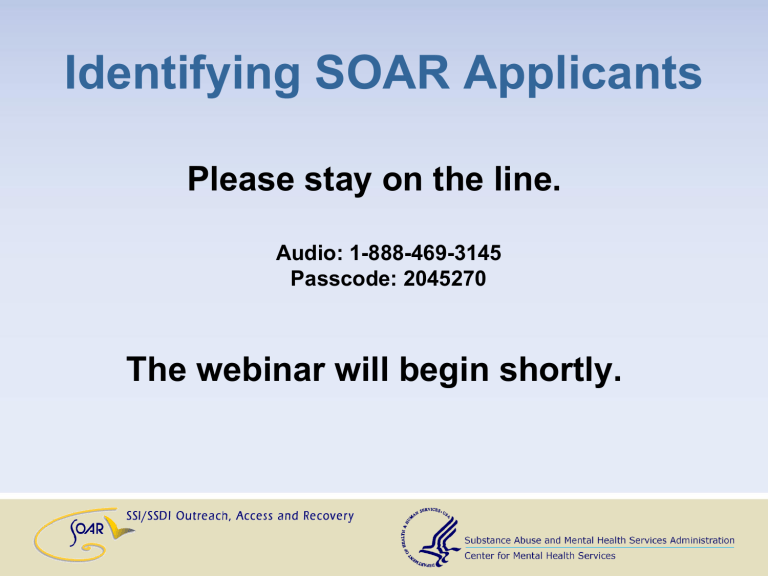
Identifying SOAR Applicants
Please stay on the line.
Audio: 1-888-469-3145
Passcode: 2045270
The webinar will begin shortly.
Identifying SOAR
Applicants
Presented by:
SAMHSA SOAR Technical Assistance Center
Policy Research Associates, Inc.
Under contract to:
Substance Abuse and Mental Health Services Administration
U.S. Department of Health and Human Services
Webinar Instructions
Question instructions
Muting
Recording availability
Downloading documents
Evaluation
SOAR Training
2-day Stepping Stones to Recovery training
www.prainc.com/soar
Find your State
Agenda
Tools for Identifying Applicants
– Kristin Lupfer, SAMHSA SOAR Technical Assistance Center
Identifying a SOAR Applicant in Baltimore
– Margaret Flanagan, Health Care for the Homeless, Baltimore, MD
Accepting SOAR Referrals With Limited
Resources
– Jessica Calys, Wyandot Mental Health Center, Kansas City, KS
Questions and Answers
Tools for Identifying SOAR
Applicants
Kristin Lupfer
SAMHSA SOAR Technical Assistance Center
Policy Research Associates, Inc.
The Challenge
Limited resources
Limited time
A lot of people need our help
Applications involving mental illness and co-occurring disorders are complicated
Using the Tool
Identify individuals who most need your assistance
Do not discourage anyone from applying for SSA benefits
Plan for alternative service or referral
SOAR Fundamentals
Key eligibility criteria for SSA disability benefits
– Severe impairment that affects ability to earn SGA
– Duration requirements
– Symptoms
– Functional impairment
SOAR Recommends
Not essential, but may strengthen an application
– Prescribed medications, ongoing symptoms
– Obtainable medical evidence or one time exam is sufficient
– Difficult work history
Making it Work For You
Add your program criteria
Use in conjunction with other assessment tools
Consult with colleagues or the
SOAR TA Center
Identifying a SOAR Applicant in Baltimore
Margaret Flanagan, MSW
Health Care for the Homeless
Baltimore, Maryland
Identifying a SOAR Applicant –
Baltimore, MD
Citywide trained providers
– Utilization of applicant checklist
– Discussion of individual
– Trigger questions and/or follow-up information
Outreach initiative
– Referral
– Outreach
– More in depth assessment/review of medical records
Identifying a SOAR Applicant
Homeless or at risk of homelessness
Diagnosed with a psychiatric condition
Experiencing ongoing symptoms
Experiencing functional impairments stemming from symptoms
Not working and unable to work SGA due to impairments
Trigger Questions
Utilize tool to frame appropriateness
Each stage has additional ‘trigger questions’ that are important in decision
– Age + diagnosis
– Diagnosis (type and duration)
– Treatment history
– Substance use
– Work history
Determination if appropriate
Age
– Longevity of symptoms
– Diagnosis
– Treatment history
New diagnosis/type of diagnosis
– Medical evidence available
Medical evidence
– The listings or ‘blue book’
– Medical Summary Report can appropriately convey impairments
Determination if appropriate (cont.)
Substance Use
– Periods of sobriety
– What use means to individual
– Materiality
Work history
– Failed attempts, scattered, long periods
Prior application attempts/denials
Common reasons not appropriate
Goal of employment
Lack of severity of conditions
New diagnosis and duration
Somatic conditions
Hearings Level
Handling of non-SOAR
applicants
Employment
– Moving forward with employment and disability
Severity of conditions/duration
– Reasoning behind severity – tips on how to assist through ‘normal’ process
Somatic conditions
– Utilize Medical Summary Report or functional assessment for medical conditions – how impacts day-to-day functioning
Tips for working at hearings level
Accepting SOAR Referrals with Limited Resources
Jessica Calys, LMSW
Wyandot Mental Health Center
Kansas City, Kansas
WMHC SOAR Referral Process
Informal
Apply what we have learned as SOAR
Case Managers
Use information from DDS
Serve as appointed representative or refer to another service
Referral Sources
Active consumers at the mental health center
SOAR is a limited resource
– 2 case managers
Referral Form
Referral Process
Sent to SOAR coordinator
Coordinator or case manager calls
DDS
DDS provides information on past claims
Chart Review
Intake: presenting problem, reported symptoms, previous psychiatric history/treatment, client’s report of medical risks, current medications, strengths and additional resources, suicide/homicide history or risk, safety concerns, bio-psychosocial history, legal involvement, history of abuse/trauma, substance abuse/use, mental status exam, and diagnostic summary.
Medication history with Wyandot Center
Progress notes
Looking For:
Functional information
Past or current work history
Treatment history
Alternatives to SOAR Assistance
Assist in completing online application, explain process
Provide a list of attorneys who are good collaborators
Refer to the agency’s supported employment program
Questions and Answers
Facilitators:
SAMHSA SOAR Technical Assistance Center
Policy Research Associates, Inc.
For More Information on SOAR
Visit the SOAR website at www.prainc.com/soar
Or contact:
SAMHSA SOAR TA Center
Policy Research Associates, Inc.
Delmar, NY
518-439-7415 soar@prainc.com



